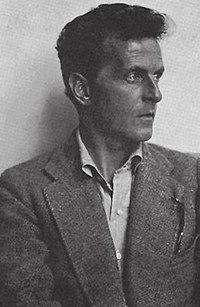Ludwig Wittgenstein
Ludwig Josef Johann Wittgenstein (IPA: luːtvɪç ˈjoːzɛf ˈjoːhan ˈvɪtgənʃtaɪn German bhasa me) (26 April 1889 – 29 April 1951) ek Austrian philosopher rahaa. Uu jaada kar ke kaam basics of logic, philosophy of mathematics, philosophy of mind, aur the philosophy of language me karis hae.[1] Uske twentieth century ke philospher logan me se ek khaas philosopher maana jaawe hae.
| Western Philosophy 20th-century philosophy | |
|---|---|

Wittgenstein ke chapa 1930 me | |
|
Name |
Ludwig Josef Johann Wittgenstein |
|
Birth |
|
|
Death |
April 29, 1951 (aged 62) |
|
School/tradition |
Analytic philosophy, Postanalytic philosophy |
|
Main interests |
Metaphysics, Epistemology, Logic, Philosophy of language, Philosophy of mathematics, Philosophy of mind |
|
Influences |
Gottlob Frege, Bertrand Russell, Arthur Schopenhauer, George Edward Moore, Piero Sraffa, Frank P. Ramsey |
|
Influenced |
Bertrand Russell, G. E. M. Anscombe, Norman Malcolm, Rush Rhees, D.Z. Phillips, P.M.S. Hacker, Vienna Circle, Logical Positivism, Analytic Philosophy, Ordinary language philosophy |
62 saal ke umar me uske maut se pahile,[2] khaali ek buk jon ki Wittgenstein publiss karis rahaa the Tractatus Logico-Philosophicus rahaa. Uske duusar buk, Philosophical Investigations ke uske maut ke baad chapa gais rahaa. Ii duuno buk ke analytic philosophy me khaas buk maana jaawe hae.[3]
Jindagi
badloLudwig Wittgenstein ke janam Vienna me 26 April 1889me, Karl aur Leopoldine Wittgenstein se bhaes rahaa. Uu aath larrkan me se ek rahaa aur Austro-Hungarian empire ke ek sab se dhani palwaar me paida bhaes rahaa. Uske pitaji ke mai-baap, Hermann Christian aur Fanny Wittgenstein, ek Jewish palwaar me paeda bhaen rahaa lekin Protestantism me concert hoe gain rahaa, aur 1850s me Saxony se Vienna jaae ke baab Viennese Protestant professional classes me mil gae rahin. Ludwig ke pitaji, Karl Wittgenstein, ek industrialist ban ke iron and steel me dher paisa banais. Ludwig ke maiya Leopoldine, jiske janam ke naam Kalmus rahaa, Nobel Prize laureate Friedrich von Hayek ke aunty rahii. Karl ke Protestant bane ke bawajuut,aur uske baap ke Jewish hoe ke bawajuut bhi, Wittgenstein ke larrkan ke Roman Catholics baptized karaa gais rahaa — jon ki uske naani ke dharam rahaar — Ludwig ke mare ke baad uske Roman Catholic burial dewa gais rahaa.[4]
Notes and references
badlo- ↑ "Time 100: Scientists and Thinkers". Time Magazine Online. Archived from the original on 2009-05-08. Retrieved 2009-09-21. Unknown parameter
|accessyear=ignored (|access-date=suggested) (help); Unknown parameter|accessmonthday=ignored (help) - ↑ Give Him Genius or Give Him Death. Article by Anthony Kenny, New York Times
- ↑ Wittgenstein’s Significance Archived 2008-08-20 at the Wayback Machine, article by Mark J. Cain, Philosophy Now 2001
- ↑ Ludwig Wittgenstein at the Internet Encyclopedia of Philosophy
Bibliography
badloKaam
badloKhaas buk
badlo- Logisch-Philosophische Abhandlung, Annalen der Naturphilosophie, 14 (1921)
- Tractatus Logico-Philosophicus, translated by C.K. Ogden (1922)
- Philosophische Untersuchungen (1953)
- Philosophical Investigations, translated by G.E.M. Anscombe (1953)
Duusra websites
badlo- Cambridge Wittgenstein Archive - German and English, includes pictures, biography, searchable database of manuscripts.
- Wittgenstein's works are edited in an electronic edition Archived 2011-07-24 at the Wayback Machine (and sold on CDROM) at the University of Bergen in Norway.
- The Wittgenstein Portal
- A collection of Ludwig Wittgenstein's manuscripts Archived 2006-09-25 at the Wayback Machine is held by Trinity College, Cambridge, England.
- Ludwig Wittgenstein (1889–1951) is a comprehensive but old resource of Wittgensteinian material.
- Wittgenstein program from In Our Time (BBC Radio 4).
- T.P. Uschanov's page Wittgenstein links